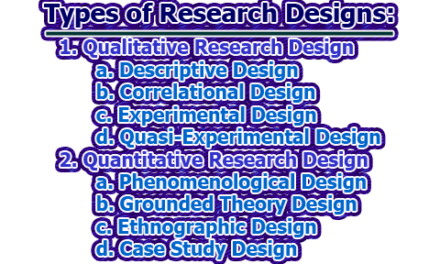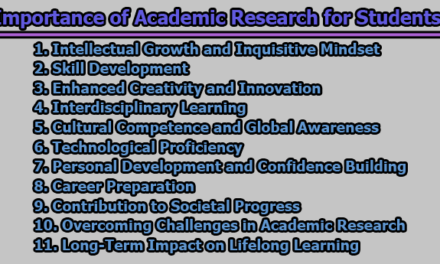Research Philosophy: Positivism, Interpretivism, and Pragmatism
Research philosophy refers to the set of beliefs, assumptions, and methodologies that guide the way researchers approach their investigations. It provides a framework for understanding the nature of knowledge, the role of the researcher, and the methods used to gather and interpret data. There are several research philosophies, but three of the most widely recognized and influential ones are positivism, interpretivism, and pragmatism. In this article, we will explore these three research philosophies in brief, providing a simple and accessible explanation of each.
1. Positivism:
Positivism is a research philosophy that originated in the natural sciences and gained prominence in the late 19th and early 20th centuries. It is based on the belief that scientific knowledge should be derived from empirical observation and objective measurement. Positivists assume that there is a single reality that exists independently of our perceptions and that this reality can be understood through systematic and rigorous scientific methods.
Key Principles:
a. Objectivity: Positivists emphasize the importance of objectivity in research. They argue that researchers should strive to eliminate bias and personal opinions from their investigations. Objectivity is achieved through careful design and execution of experiments, reliance on measurable and observable data, and the use of statistical analysis to draw conclusions.
b. Determinism: Positivism assumes that the social world operates according to universal laws that can be discovered through scientific inquiry. It suggests that human behavior is determined by external factors such as social structures, cultural norms, and economic conditions. This deterministic view implies that social phenomena can be predicted and explained using objective and generalizable laws.
c. Reductionism: Positivists often employ reductionism, which involves breaking down complex phenomena into smaller, more manageable parts. They believe that by studying the individual components of a system, they can gain a better understanding of the whole. Reductionism allows researchers to isolate specific variables and test their effects in controlled conditions.
d. Quantitative Methods: Positivism favors quantitative research methods, such as surveys, experiments, and statistical analysis. These methods provide numerical data that can be analyzed statistically to identify patterns, correlations, and cause-and-effect relationships. Positivists value the reliability and replicability of quantitative research, as it allows for precise measurement and comparison.
Critiques and Limitations:
Critics argue that positivism has several limitations. They claim that the positivist approach overlooks the subjective experiences and meanings that individuals attach to their actions. Additionally, positivism’s focus on observable and measurable phenomena may neglect important contextual factors that influence human behavior. Critics also argue that the notion of objective reality is problematic, as individuals’ perceptions and interpretations shape their understanding of the world.
2. Interpretivism:
Interpretivism, also known as constructivism or hermeneutics, emerged as a response to the limitations of positivism in the social sciences. It emphasizes the subjective nature of human experience and focuses on understanding social phenomena through the meanings and interpretations that individuals assign to them. Interpretivists believe that social reality is socially constructed and context-dependent and that it cannot be reduced to objective laws or generalizations.
Key Principles:
a. Subjectivity: Interpretivism acknowledges that individuals have unique experiences, perspectives, and interpretations of the world. Researchers aim to understand these subjective meanings by engaging in dialogue and interaction with research participants. They seek to uncover the complex and diverse ways in which individuals create and attribute meaning to their actions and social interactions.
b. Social and Historical Context: Interpretivists emphasize the importance of understanding social phenomena within their specific social and historical contexts. They recognize that individuals’ beliefs, values, and behaviors are shaped by their cultural, historical, and institutional backgrounds. Researchers employ qualitative methods, such as interviews, observations, and textual analysis, to capture the richness and complexity of these contextual factors.
c. Reflexivity: Interpretivism promotes reflexivity, which involves acknowledging and reflecting upon the influence of the researcher’s own background, biases, and assumptions on the research process. Researchers recognize that their interpretations are inherently subjective and influenced by their own perspectives. Reflexivity helps researchers identify and address potential biases and enhances the credibility of their findings.
d. Inductive Reasoning: Interpretivists often employ inductive reasoning, which involves deriving general conclusions from specific observations. They emphasize the importance of exploring and discovering patterns and themes in qualitative data, rather than starting with preconceived theories or hypotheses. This approach allows for the emergence of new insights and theories grounded in the data.
Critiques and Limitations:
Critics argue that interpretivism lacks objectivity and generalizability, as its focus on subjective meanings and context-specific interpretations makes it difficult to draw universal conclusions. They also claim that interpretive research can be overly reliant on the researcher’s interpretive skills, potentially introducing bias and subjectivity into the analysis. Additionally, some argue that interpretivism may prioritize understanding over explanation, limiting its ability to generate causal explanations or predict behavior.
3. Pragmatism:
Pragmatism is a research philosophy that seeks to bridge the gap between positivism and interpretivism. It emphasizes the practical consequences of knowledge and encourages researchers to adopt a flexible and problem-solving approach. Pragmatists believe that the value of knowledge lies in its usefulness and its ability to address real-world problems.
Key Principles:
- Practicality: Pragmatism prioritizes the practical applications of knowledge. Researchers are encouraged to focus on solving real-world problems and addressing the needs of individuals and communities. Pragmatists believe that research should have practical implications and be relevant to the concerns of society.
- Pluralism: Pragmatism recognizes that different research methods and approaches can be useful in different contexts. It promotes a pluralistic view that values the integration of multiple perspectives and methods. Researchers are encouraged to select the most appropriate methods based on the research question, context, and desired outcomes.
- Mixed Methods: Pragmatists often employ mixed methods, combining both qualitative and quantitative approaches, to gain a more comprehensive understanding of research phenomena. They believe that this integration of methods can provide a more holistic and nuanced perspective, drawing on the strengths of each approach.
- Pragmatic Truth: Pragmatism defines truth in terms of its practical consequences. Rather than seeking absolute or universal truth, pragmatists focus on the usefulness and effectiveness of knowledge in solving problems and improving outcomes. Truth is seen as a dynamic and evolving concept that is subject to revision based on new evidence and experiences.
Critiques and Limitations:
Critics argue that pragmatism can be seen as a compromise that sacrifices depth and rigor for practicality. They claim that the integration of different methods can be challenging and may lead to a superficial treatment of complex research phenomena. Additionally, some argue that the emphasis on practicality and problem-solving may overshadow the critical examination of underlying power structures and social inequalities.
Choosing Your Research Philosophy:
Selecting a research philosophy is a crucial step in the research process, as it provides a framework for understanding the nature of knowledge, the role of the researcher, and the methods used to gather and interpret data. The choice of research philosophy depends on several factors, including the research question, the nature of the study, and the researcher’s epistemological and ontological beliefs. In this section, we will discuss important considerations when choosing your research philosophy.
A. Research Question: The research question serves as the starting point for selecting a research philosophy. Consider the nature of your research question and the type of knowledge you seek to generate. Is your research question focused on understanding the subjective experiences and meanings of individuals? Or does it aim to identify general patterns and causal relationships? The research question will help guide your choice between interpretivism and positivism.
- If your research question focuses on exploring subjective meanings, social interactions, and cultural context, interpretivism may be a suitable choice. Interpretive research allows for in-depth exploration of individuals’ perspectives and the contextual factors that shape their experiences.
- On the other hand, if your research question aims to establish general laws, predict behavior, or test cause-and-effect relationships, positivism may be more appropriate. Positivist research emphasizes objectivity, quantifiable data, and the identification of universal patterns.
B. Nature of the Study: Consider the nature of your study, including its scope, context, and practical implications. This consideration can guide your choice of research philosophy.
- If your study is exploratory, seeks to generate new theories or concepts, or focuses on understanding complex social phenomena, interpretivism may be suitable. Interpretive research methods, such as interviews, observations, and qualitative analysis, allow for a deep exploration of individual experiences and the context in which they occur.
- If your study is more applied, aims to solve practical problems, or requires numerical data for statistical analysis, pragmatism may be a viable option. Pragmatic research emphasizes practicality, mixed methods, and the integration of different perspectives and approaches to address real-world issues.
C. Epistemological and Ontological Beliefs: Epistemology and ontology refer to your beliefs about the nature of knowledge and reality, respectively. These philosophical perspectives influence your choice of research philosophy.
- Epistemological Beliefs: Consider whether you believe knowledge is objective and can be discovered through empirical observation (positivism) or whether it is subjective and constructed through interpretation and social interactions (interpretivism). If you value subjective experiences, interpretations, and context-dependency of knowledge, interpretivism may align with your epistemological beliefs.
- Ontological Beliefs: Reflect on your beliefs about the nature of reality and whether you think it is deterministic (positivism) or socially constructed and context-dependent (interpretivism). If you believe that reality is objective, exists independently of human perception, and can be reduced to observable and measurable phenomena, positivism may align with your ontological beliefs. If you believe that reality is socially constructed and shaped by human experiences, interpretations, and cultural context, interpretivism may resonate with your ontological beliefs.
D. Practical Considerations: Practical considerations, such as available resources, time constraints, and the feasibility of data collection and analysis methods, should also be taken into account when selecting a research philosophy.
- Resource Availability: Consider the resources available to you, including funding, equipment, and access to research participants. Certain research methods and approaches may require more resources than others. For example, positivist research often requires larger sample sizes and sophisticated data collection tools, while interpretive research may rely on in-depth interviews or participant observation.
- Time Constraints: Consider the time available for conducting your research. Some research philosophies, such as positivism, often require structured data collection methods and statistical analysis, which can be time-consuming. Conversely, interpretive research may involve prolonged engagement with research participants and iterative data analysis processes.
- Feasibility of Methods: Evaluate the feasibility of different research methods within the constraints of your study. Consider the compatibility of your research question with various data collection methods (e.g., surveys, interviews, observations) and analysis techniques (e.g., statistical analysis, content analysis). Choose a research philosophy that allows you to collect and analyze data effectively within the limitations of your study.
In summary, choosing a research philosophy involves considering the research question, the nature of the study, your epistemological and ontological beliefs, and practical considerations. By carefully evaluating these factors, you can select a research philosophy that aligns with your research goals, enhances the validity of your findings, and contributes to the advancement of knowledge in your field.
Finally, we can say that positivism, interpretivism, and pragmatism represent distinct research philosophies, each with its own set of assumptions, principles, and methodologies. Positivism emphasizes objectivity, determinism, and quantitative methods, seeking to discover general laws that govern the social world. Interpretivism focuses on subjective meanings, social and historical context, and qualitative methods, aiming to understand the complexities of human experiences and social interactions. Pragmatism emphasizes practicality, pluralism, and mixed methods, seeking to address real-world problems and generate useful knowledge. While these research philosophies have their respective strengths and limitations, researchers often adopt a philosophy based on the nature of their research questions, the context of the study, and their own epistemological and ontological beliefs. By understanding these philosophies, researchers can make informed choices about their research approaches and contribute to the advancement of knowledge in their respective fields.
FAQs:
What is research philosophy?
Research philosophy refers to the set of beliefs, assumptions, and methodologies that guide the way researchers approach their investigations. It provides a framework for understanding the nature of knowledge, the role of the researcher, and the methods used to gather and interpret data.
What is positivism?
Positivism is a research philosophy that originated in the natural sciences and emphasizes the importance of empirical observation and objective measurement. Positivists believe in a single, objective reality that exists independently of our perceptions and can be understood through systematic and rigorous scientific methods.
What is interpretivism?
Interpretivism, also known as constructivism or hermeneutics, is a research philosophy that emphasizes the subjective nature of human experience and focuses on understanding social phenomena through the meanings and interpretations that individuals assign to them. It recognizes that social reality is socially constructed and context-dependent.
What is pragmatism?
Pragmatism is a research philosophy that seeks to bridge the gap between positivism and interpretivism. It emphasizes the practical consequences of knowledge and encourages researchers to adopt a flexible and problem-solving approach. Pragmatists believe that the value of knowledge lies in its usefulness and its ability to address real-world problems.
What is the significance of choosing a research philosophy?
Choosing a research philosophy is significant because it provides a framework for understanding the nature of knowledge, the role of the researcher, and the methods used to gather and interpret data. It guides the entire research process, from formulating research questions to selecting appropriate methodologies.
How do I choose the right research philosophy?
Choosing the right research philosophy involves considering several factors:
- Research question: Consider the nature of your research question and the type of knowledge you seek to generate. Is it focused on subjective experiences or general patterns? This will guide your choice between interpretivism and positivism.
- Nature of the study: Evaluate the scope, context, and practical implications of your study. Does it require in-depth exploration or solving real-world problems? This can guide you towards interpretivism or pragmatism, respectively.
- Epistemological and ontological beliefs: Reflect on your beliefs about the nature of knowledge and reality. Do you value subjective interpretations or objective observations? This will align with interpretivism or positivism, respectively.
- Practical considerations: Consider the available resources, time constraints, and feasibility of methods. Choose a philosophy that suits the resources at your disposal and aligns with the practical requirements of your study.
Can I mix research philosophies?
Yes, it is possible to mix research philosophies, and this approach is known as methodological pluralism. Pragmatism, in particular, promotes the integration of multiple perspectives and methods. Researchers may combine qualitative and quantitative approaches or draw from different philosophies depending on the research question and objectives.
What are the advantages of each research philosophy?
- Positivism: Positivism provides objectivity and allows for generalizable findings. It emphasizes empirical evidence and can establish causal relationships.
- Interpretivism: Interpretivism enables a deep understanding of subjective experiences and social contexts. It allows researchers to explore complex social phenomena and capture rich qualitative data.
- Pragmatism: Pragmatism focuses on practical applications and problem-solving. It allows researchers to integrate various methods, gaining a comprehensive understanding of research phenomena.
Are there any limitations to each research philosophy?
- Positivism: Positivism may overlook subjective experiences and contextual factors. It can be limited in its ability to capture complex social phenomena and may neglect the influence of social and cultural factors.
- Interpretivism: Interpretivism lacks objectivity and generalizability. The subjective interpretation of data can introduce researcher bias. It may also prioritize understanding over explanation or prediction.
- Pragmatism: Pragmatism may sacrifice depth and rigor for practicality. Integrating different methods can be challenging, and the focus on problem-solving may overshadow the critical examination of underlying social issues.
Can I change my research philosophy during a study?
While it is possible to change research philosophies during a study, it should be done cautiously and with valid reasons. Changing the research philosophy may affect the research design, data collection, and interpretation of findings. Consult with experienced researchers or your academic advisor before making such a change.
References:
- Creswell, J. W. (2014). Research Design: Qualitative, Quantitative, and Mixed Methods Approaches. Sage Publications.
- Guba, E. G., & Lincoln, Y. S. (1994). Competing paradigms in qualitative research. In N. K. Denzin & Y. S. Lincoln (Eds.), Handbook of qualitative research (pp. 105-117). Sage Publications.
- Morgan, D. L. (2007). Paradigms lost and pragmatism regained: Methodological implications of combining qualitative and quantitative methods. Journal of Mixed Methods Research, 1(1), 48-76.
- Ponterotto, J. G. (2005). Qualitative research in counseling psychology: A primer on research paradigms and philosophy of science. Journal of Counseling Psychology, 52(2), 126-136.
- Smith, J. A., Flowers, P., & Larkin, M. (2009). Interpretative phenomenological analysis: Theory, method, and research. Sage Publications.
- Smith, M. J., & Heshusius, L. (2005). Closing the gap: From evidence to action. Heinemann.
- Tashakkori, A., & Teddlie, C. (Eds.). (2003). Handbook of mixed methods in social and behavioral research. Sage Publications.
- Teddlie, C., & Tashakkori, A. (2009). Foundations of mixed methods research: Integrating quantitative and qualitative approaches in the social and behavioral sciences. Sage Publications.
- Yin, R. K. (2018). Case study research and applications: Design and methods. Sage Publications.

Library Lecturer at Nurul Amin Degree College










